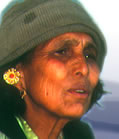 |
 |
||
 |
|||
|
RELATED THEMES development justice and crime politics OTHER LOCAL THEMES BACKGROUND |
conflict
Many of the narrators (Nepal 1-18) in this collection were interviewed in 1995; they describe small but incremental improvements in their lives. They lived, however, in an area relatively close to Kathmandu, where there was an active NGO presence. In other parts of the country progress was desperately slow, or non-existent. In 1996, the Maoist wing of the Communist Party of Nepal responded to what it saw as a corrupt regime with no interest in eradicating poverty and launched its "People's War". Since then, the Maoists' activities and influence have spread from the more remote western districts to other areas and to the heart of government. Nepal has been wracked by violence and unrest and, according to some estimates, 7,000 people have lost their lives. Many more have been displaced from the most conflict-ridden areas, primarily western Nepal. While the Maoists' prime targets are the rich and the corrupt, the reality is that the rural poor have suffered most, targeted by the army and the police as Maoist supporters and by the Maoists for food, shelter and recruits. Villagers are caught in a devastating atmosphere of suspicion, broken trust, attack and counter-attack. As one woman puts it: "In the end, the ones who suffer are the poor" (Nepal 26). She is one of the new narrators (interviewed in 2002) and she describes how "many changes have come.in the last six years. Life is not easy and secure in the hills like before. Development in the village has ceased totally." Infrastructure has been destroyed, schools have been closed, and productivity in the worst-hit areas has plummeted. People's hard-won development gains have been halted or even reversed. "It's been around a year since the Maoists came to the village. They completely destroyed the women's savings group that we had established. Maoists came and began pointing guns. We are told not to have meetings and they would not let us organise any programmes. By buying some goats or doing some business, there could have been some profit at least. Perhaps.we could have done something big. We had a chance to make some progress. Even that is gone now." These narrators describe the strain and disruption of living with a continual sense of anxiety and fear. The human cost of being caught between warring sides in remote areas where there is no state apparatus or support is particularly vividly evoked by two narrators (Nepal 25 and 26). They describe how people close to them have been injured, imprisoned and killed as a result of the conflict. One woman says despairingly of the level of violence: "[The Maoists] have gone to war either to bring a change of government or to die... To protect their jobs also, the police and army have come out to either kill or get killed. Both sides are going around killing or being killed" (Nepal 26). A glimmer of hope resides in the continuation of the ceasefire of January 2003, and of high-level talks between the government and the Maoists. Meanwhile, these women's words speak for themselves. quotes about conflict"Everyone in the village was like a brother or sister. We had no inkling at that time who all came to the village from outside, who all stayed, and what all happened. Now [since the Maoist insurgency] it seems like everybody is fighting among themselves." "My son-in-law was a farmer. the army took him away. I don't know [why]. Poor chap, what politics would he do? He would just plough and live. He isn't educated. His father died when he was just a child. He looked after five or six [family members] - where would he study or be involved in politics? .he knows nothing. Yes, I feel he was needlessly taken away.my other son-in-law is in Kathmandu hospital after the Maoists broke his limbs. He still can't move his hands and feet. They haven't let his family live in peace in the village, beating and chasing them." "Where was the fear [in the past]? .There was nothing to fear even if you walked through the forest all night or if you spent the night there. Now, it is frightening to even walk out on your own from here. As soon as night falls, one is afraid to step out of the door. Such times have come on us, child. We used to walk around singing the whole night while collecting firewood. Now that sort of life has gone." "I am not on the side to say whatever Maoists did was right. They also have many weaknesses. It's not good that Maoists are also levying tax, collecting 20 kg of paddy. Now for the poor, 20 kg of paddy will be enough to eat for two days. [Also] maybe one or two may have reported to the police about Maoists but on that pretext it is not good [for the Maoists] to kill ordinary people. When the police and army beat and threaten to kill someone unless he tells them who the Maoists are, that person may point to someone and say the person is a Maoist just to save his own life. And the army and police also resort to killing such people after they are caught and taken, I hear. The practice of killing from both sides is not good." ".It is frightening for the kids. They say they are scared to go to study, they feel the Maoists might abduct them. I am frightened, of course. I have no one. It's not about being scared of dying [myself]. I'm only afraid that my sons may die or that they will be taken by the Maoists or the police. I only have them to depend on." "[My husband] was also detained by army for 28 days. He was kept blindfolded for the entire 28 days. He was beaten badly. 'All your family members are Maoists - where are they and who else are Maoists?' they said. Even since returning from the barracks he has been a sick man." "There were quite a few jatras (fairs or religious festivals). We could comfortably witness these all night. Now since the Maoists [came] it is not the same. there are restrictions, because of the fear of Maoists.. [Jatras] have become fewer. [This year] I could not go to make offerings for my mother and father. I was afraid." ".the bad part for now is that you do not get to roam around the forest freely and cannot go happily together in a group to work in a field... Now you want to get up early.to do some work but you are haunted by the feeling that a Maoist may be already there, and fear grips you. Dusk and dawn are the times to feel fear now. it's not free in the village these days." "About 35 have been taken [by the army], I hear. My own son-in-law was involved. [He] was released after a number of days. He was beaten, they say. My son-in-law is walking around, but the village teacher.was beaten so badly, he can't even stand on his feet. Now, there is no teacher to teach in the school." "[Agricultural] production has gone down. Development in the village has ceased totally. Now, due to the Maoist problem, we have not been able to take our harvested paddy to the market. The price of paddy has gone down. Many people have been displaced... The poor and ordinary people that stay there do so under constant fear from both Maoists and the army.Those who can run away.have already run away. Now the poor are still staying. In the end, the ones who suffer are the poor." "[Maoists] destroyed buildings, telephone exchange etc. They attacked the VDC building. They had destroyed a lot of stuff. They hit the bridge, telephone and other places. the villagers repaired [the bridge]. But they say the telephone line will be not restored for five years." |
|